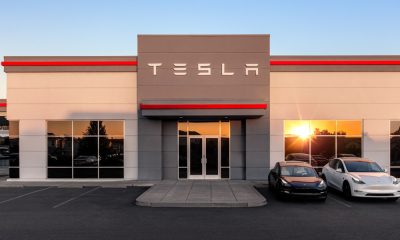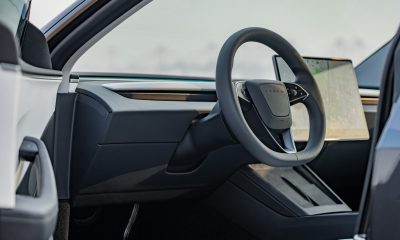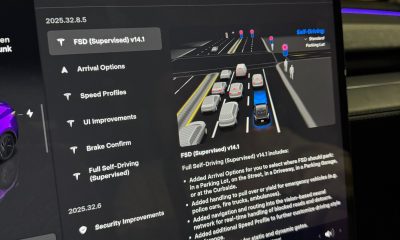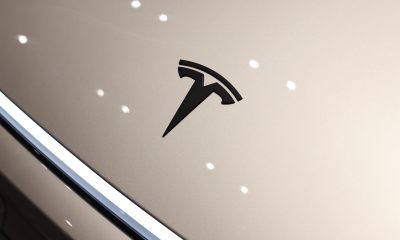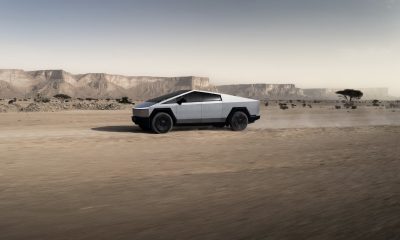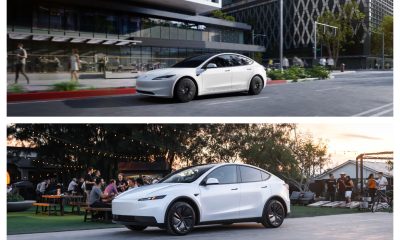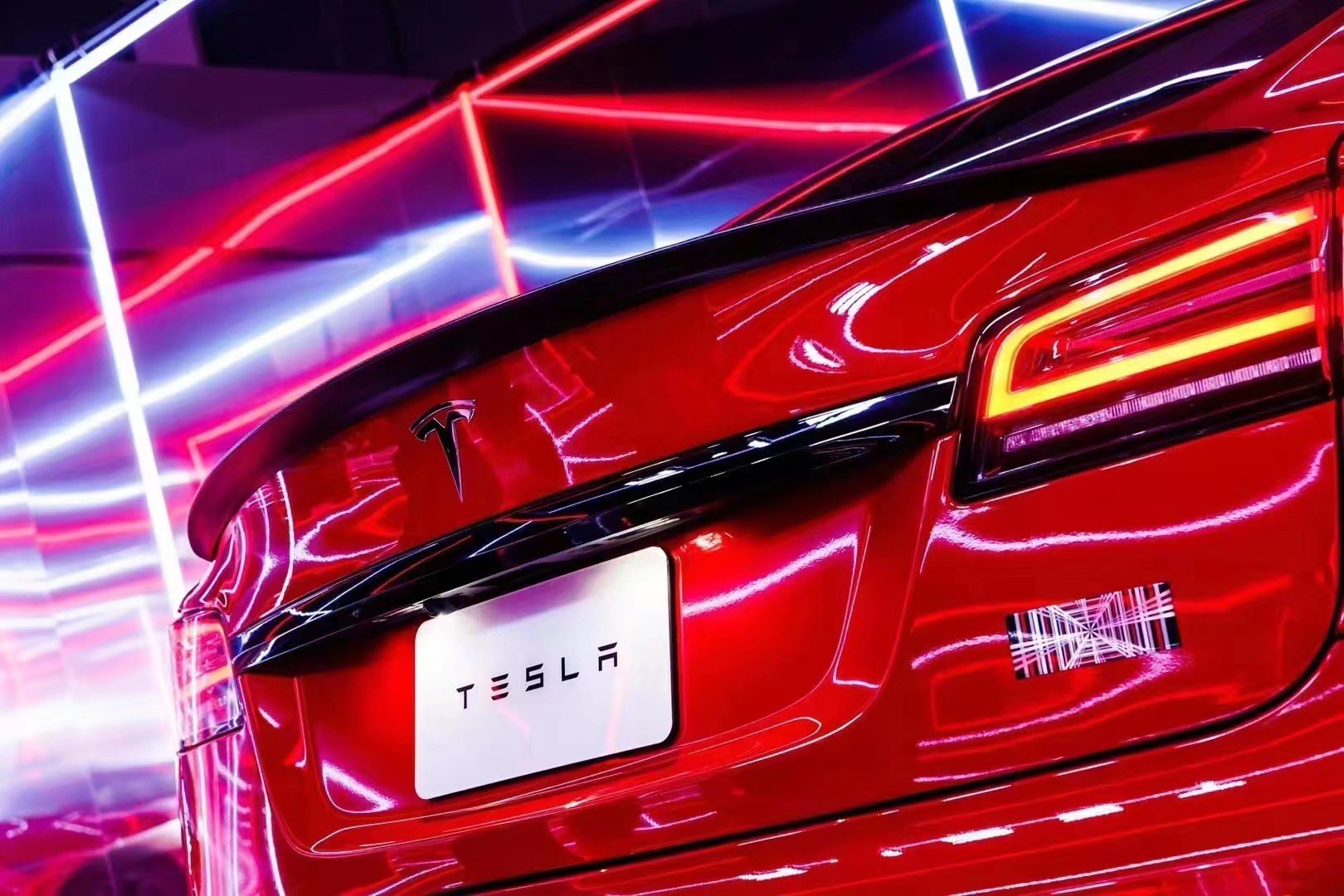
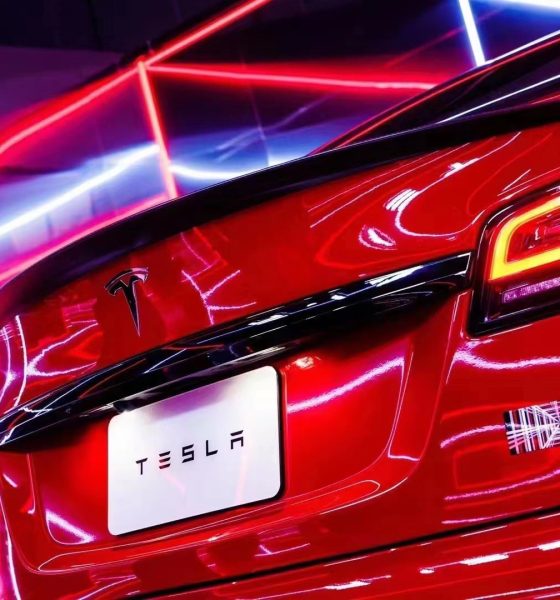
News
Tesla’s new customers come from Toyota, Honda most frequently: study
Research published by S&P Global Mobility has identified which brands consumers are leaving when they buy a new Tesla.
Tesla has become notorious for taking the sales of other notable brands as customers look to switch to electric vehicles. Now, data has been published showing which brands are losing the most customers to Tesla. S&P Global Mobility found, most notably, that over a quarter of Tesla buyers were coming from either Toyota or Honda.
Specifically, S&P’s report found that 28.6% of customers came from either Toyota (15.3%) or Honda (13.3%). Roughly another 17% were coming from German luxury brands; BMW (6.7%), Mercedes-Benz (6.2%), and Audi (4.4%). Fewer customers came from domestic brands like Ford (5.4%) and Chevrolet (4.7%).
Tesla Conquests – Credit: S&P Global Mobility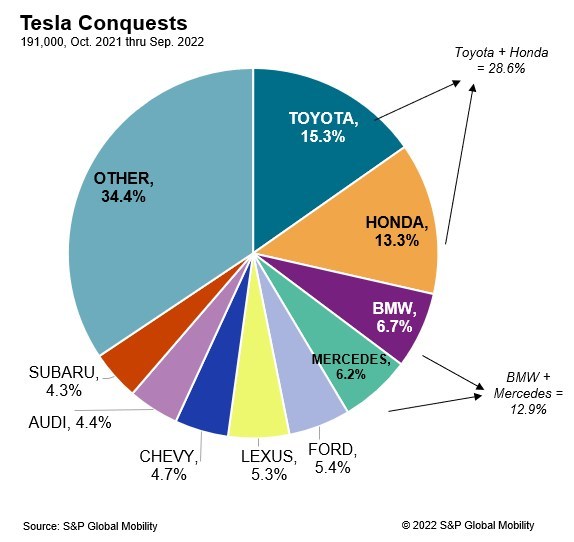
The effect of legacy brands losing customers to Tesla is perhaps most visible in the luxury segment, where the researchers found that Tesla controls 86% of the EV market. The next closest competitors were Audi (3%), Rivian (2%), and Polestar (2%). Combined, these four brands account for over 93% of luxury EV sales in the U.S.
Credit: S&P Global Mobility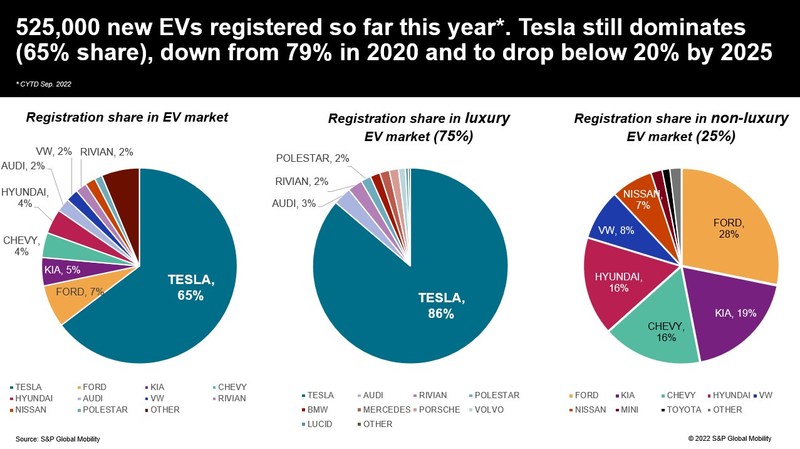
Customers leaving gas vehicles were found to most often buy a Tesla Model Y or Tesla Model 3. The survey also found that the Ford Mustang Mach-E, Hyundai Ioniq 5, and Chevy Bolt were popular options.
A couple of factors attributed to why customers left certain brands more than others. First of all, a lack of electric options had an apparent effect on results. Brands like Ford, Chevy, and Hyundai/Kia, which have EV offerings, had a clear leg up on competitors who had no electric offerings; Honda, Toyota, and Lexus. S&P also noted that those who offered cheaper electric offerings were ahead of those who did not.
Sadly, survey results indicating why customers left the brands they did were not present. Furthermore, no data indicated what percent of customers leaving a given brand chose Tesla instead of other options.
Another surprising result was regarding overall market share. Tesla controls 65% of the electric vehicle market in the United States, but that has shrunk from 79% in 2020. While the researchers pointed out that the simple growth of the EV market and the growing number of consumer options have contributed to this, another notable segment where Tesla has lost its footing is affordable electric vehicles. The segment is now led by Ford (28%), Kia (19%), Hyundai (16%), and Chevrolet (16%).
The research shows that Tesla continues to dominate the U.S. market, and brands should take note of the rapidly growing disparity between the brands with and without electric vehicle offerings. As S&P Global Mobility indicates in its conclusion, the growing market for electric vehicles will quickly determine the successful and unsuccessful automotive brands. Only time will tell if legacy brands will take notice.
What do you think of the article? Do you have any comments, questions, or concerns? Shoot me an email at william@teslarati.com. You can also reach me on Twitter @WilliamWritin. If you have news tips, email us at tips@teslarati.com!
Elon Musk
‘I don’t understand TSLAQ:’ notable investor backs Tesla, Elon Musk
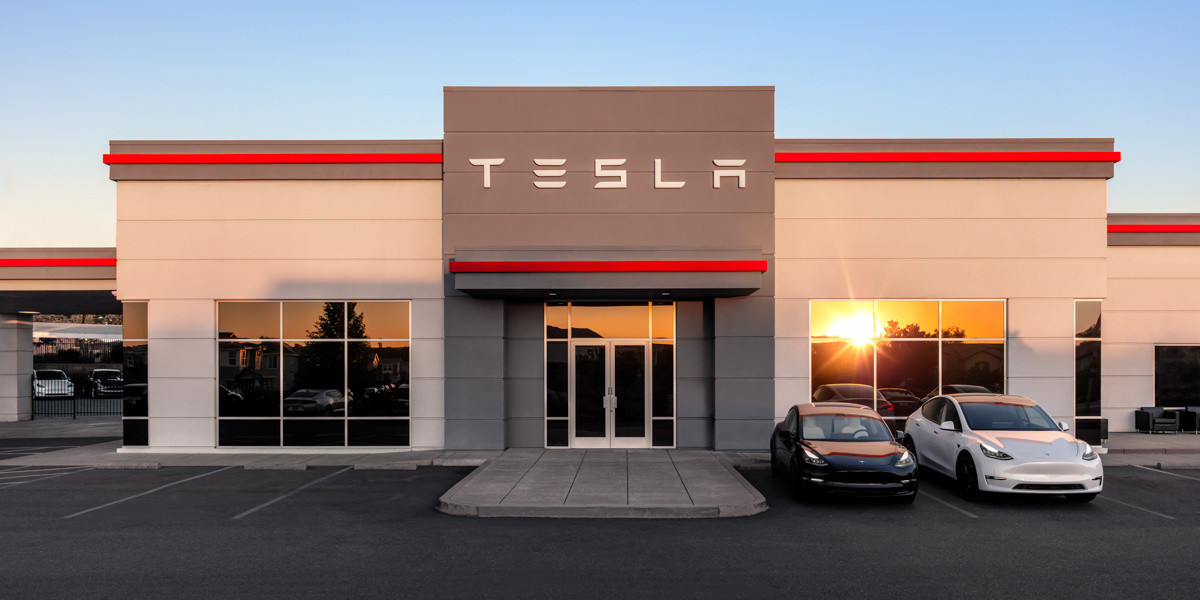
One notable investor that many people will recognize said today on X that he does not understand Tesla shorts, otherwise known as $TSLAQ, and he’s giving some interesting reasons.
Martin Shkreli was long known as “Pharmabro.” For years, he was known as the guy who bought the rights to a drug called Daraprim, hiked the prices, and spent a few years in Federal prison for securities fraud and conspiracy.
Shkreli is now an investor who co-founded several hedge funds, including Elea Capital, MSMB Capital Management, and MSMB Healthcare. He is also known for his frank, blunt, and straightforward responses on X.
His LinkedIn currently shows he is the Co-Founder of DL Software Inc.
One of his most recent posts on X criticized those who choose to short Tesla stock, stating he does not understand their perspective. He gave a list of reasons, which I’ll link here, as they’re not necessarily PG. I’ll list a few:
- Fundamentals always have and will always matter
- TSLAQ was beaten by Tesla because it’s “a great company with great management,” and they made a mistake “by betting against Elon.”
- When Shkreli shorts stocks, he is “shorting FRAUDS and pipe dreams”
After Shkreli continued to question the idea behind shorting Tesla, he continued as he pondered the mentality behind those who choose to bet against the stock:
“I don’t understand ‘TSLAQ.’ Guy is the richest man in the world. He won. It’s over. He’s more successful with his 2nd, 3rd, and 4th largest companies than you will ever be, x100.
You can admit you are wrong, it’s just a feeling which will dissipate with time, trust me.”
i dont understand “$TSLAQ”. guy is the richest man in the world. he won. it’s over. he’s more successful with his 2nd, 3rd and 4th largest companies than you will ever be, x100.
you can admit you are wrong, it’s just a feeling which will dissipate with time, trust me. https://t.co/dkqrISCldp
— Martin Shkreli (@MartinShkreli) October 8, 2025
According to reports from both Fortune and Business Insider, Tesla short sellers have lost a cumulative $64.5 billion since Tesla’s IPO in 2010.
Shorts did accumulate a temporary profit of $16.2 billion earlier this year.
News
Tesla will let you bring back this removed Model 3 part for a price
It will cost $595 and is available on Tesla’s website. You will have to have a Model 3 on your Tesla account to purchase the stalk retrofit kit.
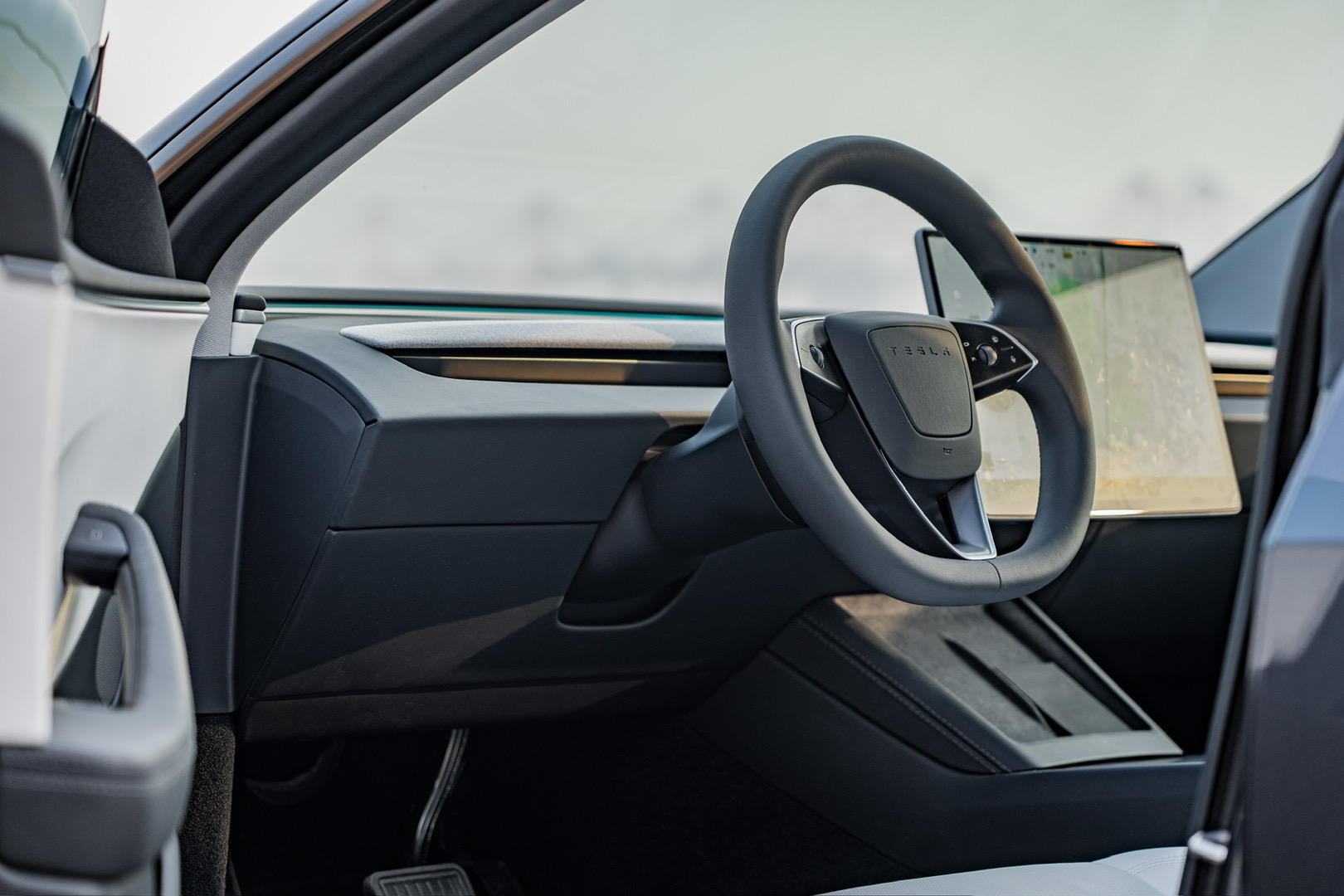
Tesla is now letting Model 3 owners in the United States bring back one part that the company decided to remove after it refreshed the all-electric sedan last year. Of course, you can do it for a price.
With the Model 3 “Highland” refresh that Tesla launched last year, one of the most monumental changes the company made was to ditch the turn signal stalk altogether. Instead, Tesla opted for turn signal buttons, which have been met with mixed reviews.
The change was widely regarded as Tesla preparing for more autonomous driving in its vehicles, especially as its interiors have gotten even more minimalistic.
The lack of a stalk in the new Model 3 was just another move the company made to adjust drivers and passengers to seeing less at the steering wheel column.
However, many drivers did not prefer the use of buttons and wanted the stalk reinstalled. Tesla allowed it in several regions, launching a retrofit kit. It has now made its way to the United States:
🚨 If you really want a stalk on your Tesla Model 3, you can pay $595 for the retrofit kit in the U.S. pic.twitter.com/dyhw4LyQX7
— TESLARATI (@Teslarati) October 8, 2025
It will cost $595 and is available on Tesla’s website. You will have to have a Model 3 on your Tesla account to purchase the stalk retrofit kit.
It is interesting to note that despite Tesla’s strategy to remove the stalk with the new Model 3, which was released in early 2024, the company did not choose to make the same move with the new Model Y.
The new Model Y launched in the United States in early 2025, and Tesla chose to install a stalk in this vehicle.
It seemed as if the turn signal buttons were too much of a polarizing feature, and although the company technically could have given orderers an option, it would not have been the most efficient thing for manufacturing.
News
Tesla Full Self-Driving v14.1 first impressions: Robotaxi-like features arrive
Tesla Full Self-Driving v14.1 is here, and we got to experience it for ourselves.
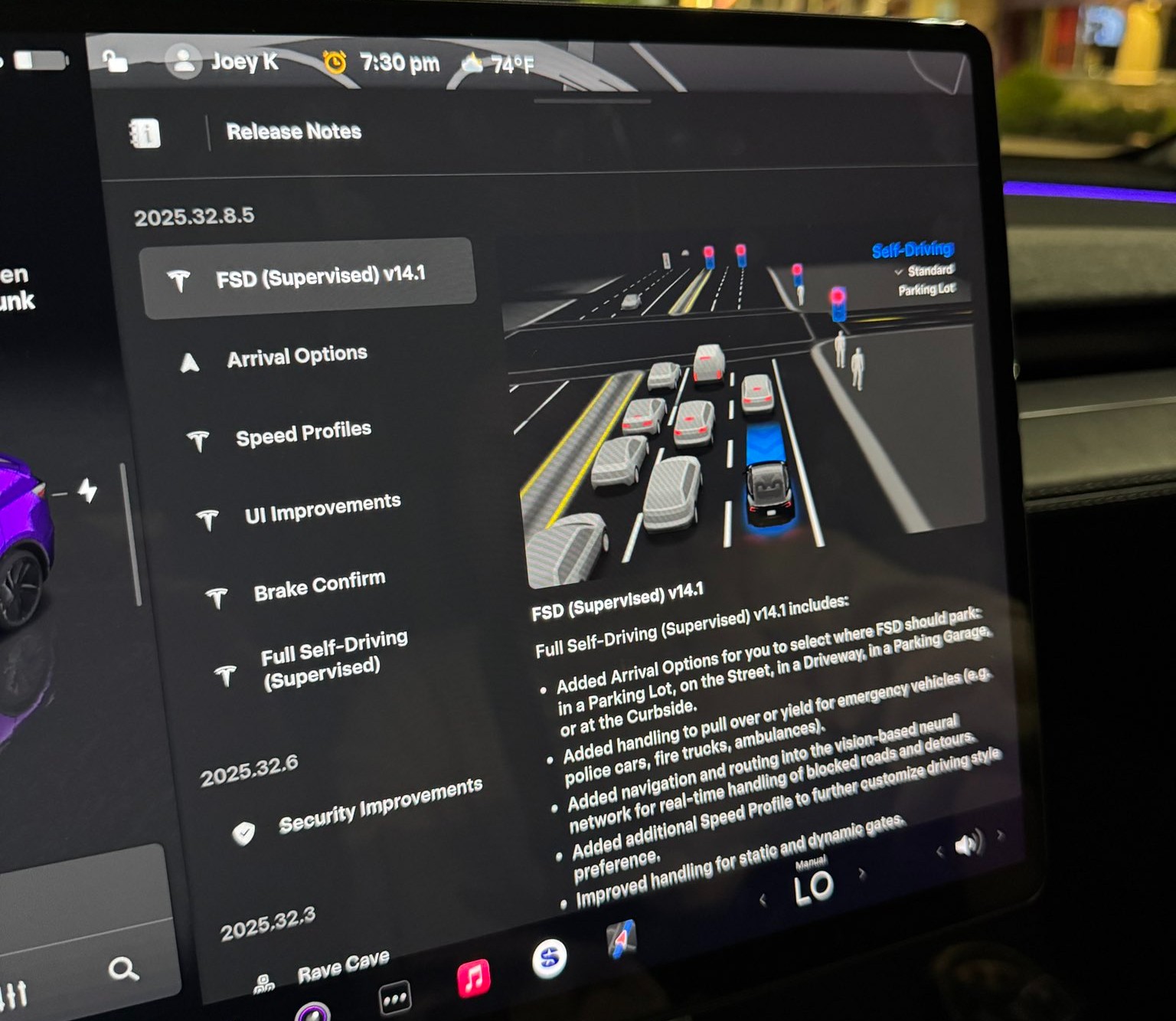
Tesla rolled out its Full Self-Driving v14.1 yesterday, its first public launch of its most robust and accurate FSD iteration yet. Luckily, I was able to get my hands on it through the Early Access Program.
The major changes in FSD v14.1 were revealed in the release notes, which outline several notable improvements in areas such as driving styles, parking, and overall navigation. Here’s what Tesla outlined fully in its release notes:
- Added Arrival Options for you to select where FSD should park: in a Parking Lot, on the Street, in a Driveway, in a Parking Garage, or at the Curbside.
- Added handling to pull over or yield for emergency vehicles (e.g. police cars, fire trucks, ambulances).
- Added navigation and routing into the vision-based neural network for real-time handling of blocked roads and detours.
- Added additional Speed Profile to further customize driving style preference.
- Improved handling for static and dynamic gates.
- Improved offsetting for road debris (e.g. tires, tree branches, boxes).
- Improve handling of several scenarios including: unprotected turns, lane changes, vehicle cut-ins, and school busses.
- Improved FSD’s ability to manage system faults and recover smoothly from degraded operation for enhanced reliability.
- Added alerting for residue build-up on interior windshield that may impact front camera visibility. If affected, visit Service for cleaning!
I wanted to try it for myself. My big must-dos were my complaints with v13.2.9, which included parking when arriving at a destination, Navigation when leaving a destination, and definitely a general improvement in the car traveling at an acceptable rate of speed, even when using the “Hurry” driving style.
Here’s what I noticed with the new Full Self-Driving v14.1:
Speed Profiles are More Realistic
I am driving on “Hurry” about 95% of the time when utilizing Full Self-Driving. In past versions, most notably v13.2.9, my Tesla would slowly reach the speed limit, and it would tend to hang out at about 1-2 MPH either above or below it.
My first observation with v14.1 was the vehicle’s tendency to get right up to speed and, since I was still on Hurry, drive slightly above the speed limit. It never got out of line; it traveled at speeds I would typically drive at manually.
I think this is a big improvement on its own, because I felt that I was pressing the accelerator too frequently in past FSD versions. Oftentimes, it just wasn’t going fast enough to justify the “Hurry” label; it felt more conservative and more like a student driver than anything.
Check it out:
🚨 Tesla Full Self-Driving v14.1 travels at more realistic speeds on local roads.
With 13.2.9, even on Hurry, it would hover the speed limit a little too much, often times traveling 1-2 MPH below or over.
It now travels at more realistic speeds. The removal of Max Speed and… pic.twitter.com/DPC0oBl3SC
— TESLARATI (@Teslarati) October 8, 2025
This was among my favorite improvements, and it was the first thing I noticed as the car navigated me to the Supercharger, where my next positive is.
Navigating into parking lots, self-parking at Supercharger
One of the changes noted in the Release Notes was the addition of Arrival Options, which allows the car to select the appropriate parking situation. Since I was going to charge, the car had already chosen “Charger” as the parking option.
Pulling into a gas station or convenience store, especially during work days, can be stressful, as they are usually congested and full of foot and vehicle traffic. In past FSD versions, I have noticed the car being slightly “jumpy” and even hesitant to proceed through the lot.
Driving through parking lots was a noticeable improvement. It seems as if the car is much more confident in making its way through, while still being aware and cautious enough to safely navigate to the Supercharger.
It then backed straight into a Supercharger stall, which was recently repaired and is once again active. I was actually upset it chose this specific stall because it had been inactive for a while. However, Tesla got this stall back up and running, the car chose it, and backed into the spot flawlessly:
🚨 Check out Tesla Full Self-Driving v14 choosing and backing into a Supercharger
After selecting this Supercharger at the beginning of my trip, my Tesla had already selected “Charger” as the arrival option pic.twitter.com/jqLNwQ9x0o
— TESLARATI (@Teslarati) October 8, 2025
This was super cool to experience, and I think it is a testament to how hard the Tesla AI team has worked. CEO Elon Musk recently stated that FSD would enable automatic parking at Superchargers, which was really awesome to experience firsthand.
I decided to leave the Supercharger and go to an auto parts store to pick up some interior cleaner and some microfiber towels. I love keeping my Tesla clean!
I also thought it would be a great opportunity to see how it would react to another parking lot, how it would navigate it, and let it choose a parking spot. It did it all flawlessly:
🚨 Here’s Tesla Full Self-Driving v14.1 navigating to a store, pulling in, choosing a parking spot, and backing right in
From v13.2.9, this is a drastic improvement. Typically, manual parking was required in past versions when arriving at retail locations. pic.twitter.com/kgFMu6dxnW
— TESLARATI (@Teslarati) October 8, 2025
I had zero complaints about everything here. All of it was done really well.
Making a choice after being caught in the middle of an intersection
I arrived at a tight intersection in Dallastown, PA, and what my car did next has catalyzed quite a conversation on X.
It proceeded out into the middle of the intersection as the light was green. It had to yield to oncoming traffic, and while waiting, the light turned yellow, then red.
Most people, including myself, would have turned right and proceeded through the intersection since the car was already past the line. However, FSD chose to back up and wait for the next light cycle, which I felt was also a more than acceptable option:
🚨 Super cool thing Tesla FSD v14.1 did: it proceeded thru this intersection to turn left, but the light had gone to red before the turn could be completed.
It put itself in reverse and backed up to the “Stop Here on Red” sign/line. Didn’t proceed at a red or impede others. pic.twitter.com/AKb1AI32fK
— TESLARATI (@Teslarati) October 8, 2025
There are some conflicting perspectives on what it chose to do here. Some said they would have proceeded and would want FSD to also proceed. I can agree with that perspective, but I also think it is not the worst thing in the world to back up. In Pennsylvania, I couldn’t find the exact law that says what is right or wrong. Instead, I did see that a left turn on red is only feasible when you’re going from a One-Way street to another One-Way.
I’m not totally sure what is “correct” here, but I think either option is fine. I have personally done both, and I’ve seen other drivers do both. I was more than fine with the car doing this, and I was honestly impressed that it did.
Navigated a busy grocery store lot, found suitable parking
This is not the busiest my local grocery store gets, but it was still congested enough for me to be impressed.
FSD decided to do one loop in the parking lot before it found a spot that it felt was good enough for me. I was perfectly fine with where it chose to park, and I thought it did a really great job. I was impressed with how stress-free I felt, as I have noted in the past that parking lots are definitely an area where Tesla needs to improve.
I was happy with its performance:
🚨 Here, @Tesla Full Self-Driving v14.1 searched for a parking space at the grocery store.
It did one loop, navigating safely through pedestrians and carts before it decided this spot was good enough for me.
This truly will take the stress out of parking at busy stores pic.twitter.com/73U3Bl7Odm
— TESLARATI (@Teslarati) October 8, 2025
Strange right turn signal as if it saw an emergency vehicle
This was the first bug I noticed with FSD v14.1. While traveling on a local road, it put the right turn signal on and approached the curb as if it was pulling over for an emergency vehicle or as if it was going to park on the street.
It then realized its mistake and proceeded:
Now for a couple bugs 🐞
Tesla FSD v14.1 put its right turn signal on as if it was going to pull over. It did move closer to curb, but then realized this wasn’t the correct maneuver for our route.
It proceeded without much issue pic.twitter.com/yoUoyzWMDM
— TESLARATI (@Teslarati) October 8, 2025
I’m not super sure what caused this, but I was a tad bit confused. There were no police cars, ambulances, or anyone with flashing lights to my rear. There was a dump truck on the other side of the road, and I almost felt like the way it navigated “around” that was probably what triggered it.
Navigation is still making strange decisions
I’ve written about navigation and my discontent with some of its decisions. It seems v14.1 didn’t resolve much of anything with navigation, and it did a couple of things wrong.
The first was that it tried to take the illogical and pointless path out of the Supercharger. I wrote about this a few days ago, as FSD tried to take my car the wrong way.
It did it again, but I overrode the decision, and it was all okay:
Bug 🐞 no. 3: I have this issue at this Supercharger and I talk about it frequently.
Navigation takes illogical and strange exit from Supercharger. I override, turning left instead of right, Nav adjusts and picks correct routing. Hoping this is resolved soon. pic.twitter.com/4VsCGHZbYW
— TESLARATI (@Teslarati) October 8, 2025
This is a minor issue, but it is still pretty frustrating. Hopefully, the navigation will learn after performing this adjustment after enough times.
The next navigation issue was more frustrating than the Supercharger one, especially considering it completely ignored the route. The navigation had the vehicle very clearly heading straight, but out of nowhere, the right turn signal went on. I overrode it, but the car still turned right, ignoring the navigation completely:
Bug 🐞 no. 2: Navigation clearly shows the route continuing straight through the traffic light. I noticed the right turn signal coming on, so I overrode it.
The car turned right anyway. I took over and drove manually until I was able to get to a stop so I could re-activate FSD pic.twitter.com/nxt4UlRqkK
— TESLARATI (@Teslarati) October 8, 2025
I ended up taking over here and driving until I could get to a stop sign.
Final Thoughts
I am really impressed with all of the changes Tesla made with FSD v14.1, and while there were a handful of bugs, things were tremendously better than v13.2.9.
-
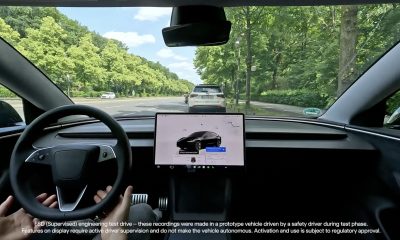
 Elon Musk2 weeks ago
Elon Musk2 weeks agoTesla FSD V14 set for early wide release next week: Elon Musk
-
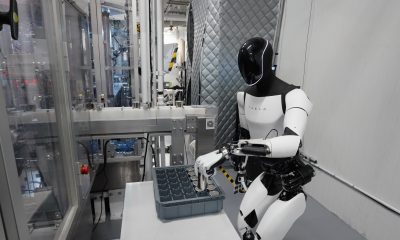
 News2 weeks ago
News2 weeks agoElon Musk gives update on Tesla Optimus progress
-
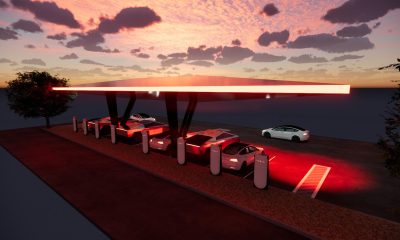
 News2 weeks ago
News2 weeks agoTesla has a new first with its Supercharger network
-
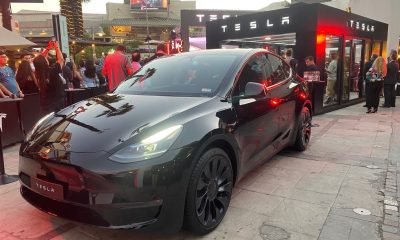
 News2 weeks ago
News2 weeks agoTesla job postings seem to show next surprise market entry
-
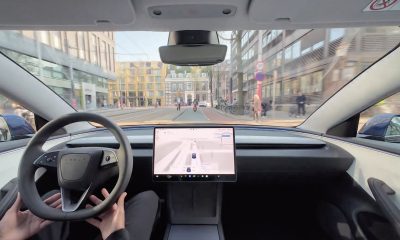
 Investor's Corner2 weeks ago
Investor's Corner2 weeks agoTesla gets new Street-high price target with high hopes for autonomy domination
-

 Lifestyle2 weeks ago
Lifestyle2 weeks ago500-mile test proves why Tesla Model Y still humiliates rivals in Europe
-
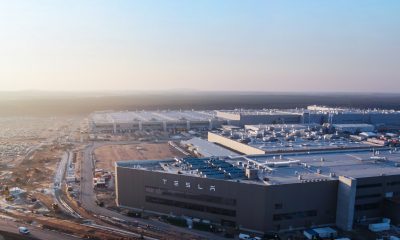
 News1 week ago
News1 week agoTesla Giga Berlin’s water consumption has achieved the unthinkable
-
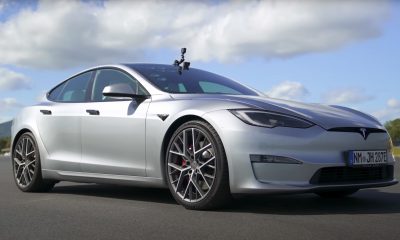
 Lifestyle2 weeks ago
Lifestyle2 weeks agoTesla Model S Plaid battles China’s 1500 hp monster Nurburgring monster, with surprising results


